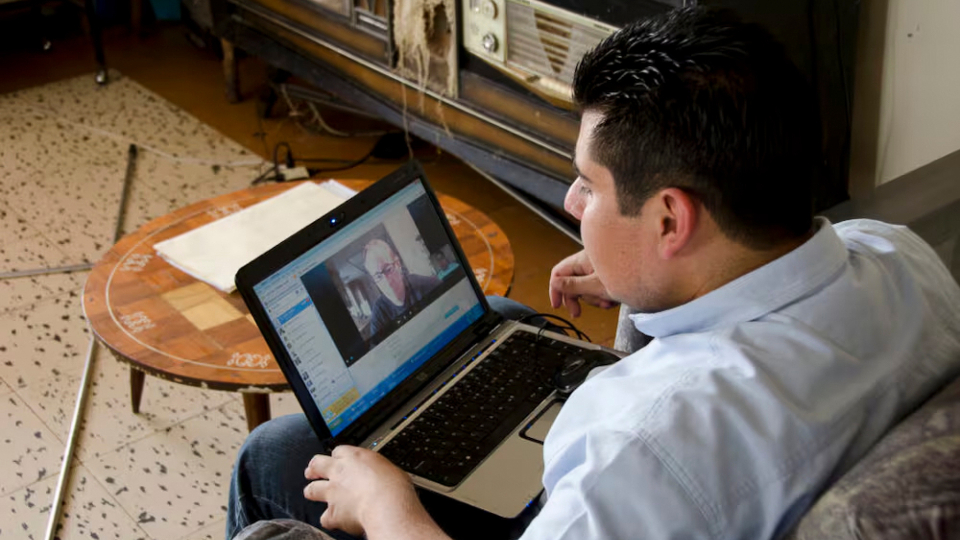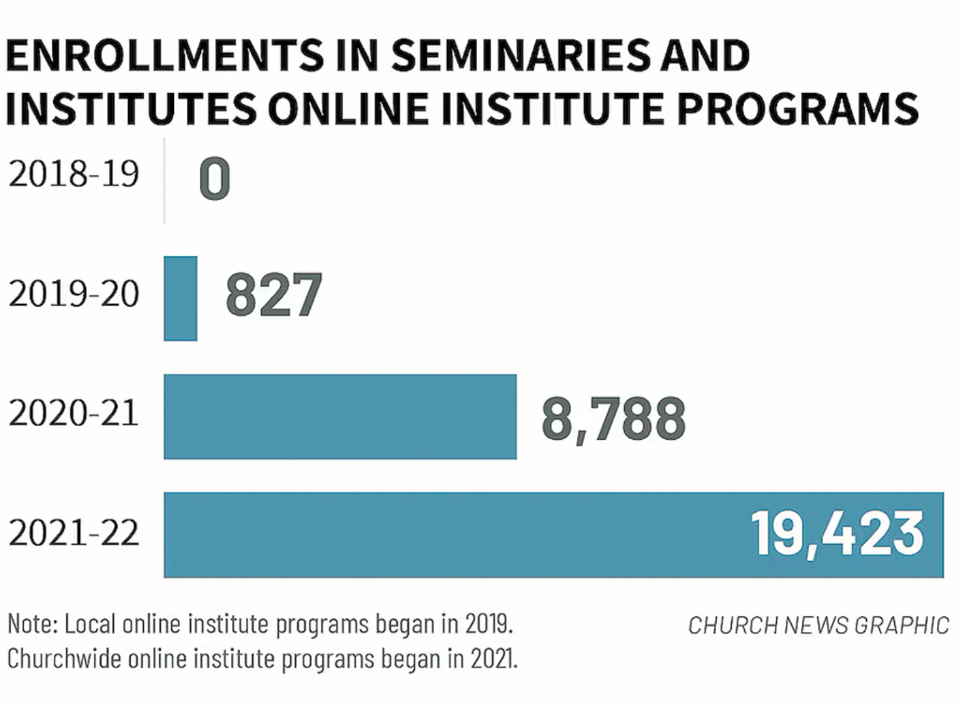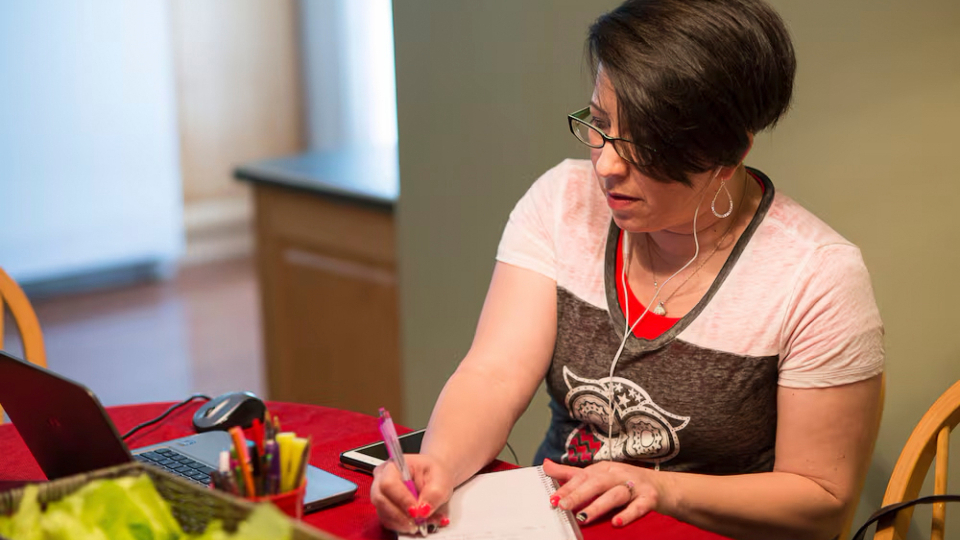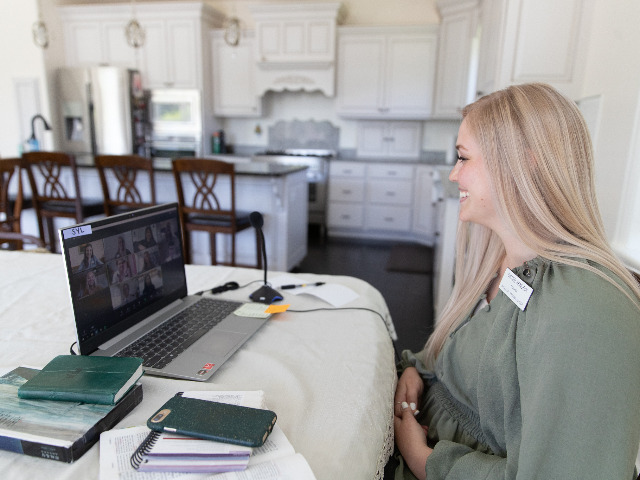
Online-Institute-teachers
BYU–Pathway student Raul Hidalgo participates in an online class in Puebla, Mexico. Photo by Michael Lewis, BYU–Pathway, courtesy of Church News. All rights reserved.This story appears here courtesy of TheChurchNews.com. It is not for use by other media.
By Rachel Sterzer Gibson, Church News
For Kathleen Anderson, teaching online institute over the past three years has been full of blessings — some of them unexpected.
As a mother, grandmother and lifelong Latter-day Saint, Anderson has had many opportunities to teach the gospel through the years in a family, ward or stake setting. When she became an online teacher, she anticipated feeling the love of the Savior for her students.
“But I didn’t anticipate the friendships that would form,” she told the Church News. “It’s just so fun to be able to have the friendships develop over the course of the semesters. They realize that I truly do care about them, and they learn to trust me and share with me things that are happening in their lives. I am able to pray for them or fast for them, and they do the same for me.”
During the past semester, Anderson had some health challenges in her family. “My students have been willing to pray for my family and to fast for my family and put family names on prayer roll at the temple.”
In teaching a course titled “Jesus Christ and His Everlasting Gospel,” Anderson has facilitated gospel discussions with students ages 17 to 72, from countries as far away as Japan, Sweden and Central Africa — all while sitting at her kitchen table.
“I always feel so uplifted and like my mind has been expanded after gathering with my students, and I haven’t even left my home,” Anderson said.
Recently, the Church announced a new service missionary opportunity for qualified members of The Church of Jesus Christ of Latter-day Saints ages 26 and older: To increase the faith of students worldwide by serving as an online institute teacher.
“What a great way to serve a mission,” Anderson said of the online institute service missionary opportunity. “If you want to have an at-home mission, that would be such a perfect way to do it.”
Why the Need for More Teachers?
BYU–Pathway Worldwide is known as the access provider of the Church Educational System. Available anywhere in the world, it provides access to low-cost certificates and degrees offered through BYU–Idaho and Ensign College.
Like other entities within CES, BYU–Pathway students are expected to increase their spiritual learning by taking religion courses. When BYU–Pathway first launched, religion courses were provided through BYU–Idaho’s Department of Religious Education. When Ensign College became a partner in 2021, BYU–Pathway students could take religion courses through BYU–Idaho or through institute.
Beginning in January 2025, however, all of BYU–Pathway Worldwide’s religion courses will be provided through online institute.

Online-Institute-teachers
Four students from BYU–Pathway Worldwide pose for a photo. Photo courtesy of BYU–Pathway Worldwide, courtesy of Church News. All rights reserved.“Online institute is essentially becoming BYU–Pathway Worldwide’s religious education provider,” explained Matthew Langton, director of online learning for Seminaries and Institutes of Religion.
So just like Brigham Young University, BYU–Idaho or BYU–Hawaii have their own religion departments that provide spiritual-based learning throughout a student’s educational journey, “online institute will be [BYU–Pathway’s] religion department.”
Institute will provide the curriculum and the instruction for these classes, Langton said. “We’ll provide the teachers and the classes themselves. BYU–Pathway will provide the infrastructure and the support services and so forth.”
Why the change? For one, it’s one more way to decrease the cost to the student.
Since launching in 2009, BYU–Pathway Worldwide has continued to innovate in order to make its program even more affordable. It currently charges about half the price of a community college but offers even more discounts on top of that.
For example, any student who has returned from a mission for The Church of Jesus Christ of Latter-day Saints within the past 60 months is eligible for a 25% tuition discount. BYU–Pathway students can also receive a tuition discount of 10%, 25% or 50% based upon need. In addition, the reduced price of tuition for students who start their degree through BYU–Pathway’s PathwayConnect is locked in for the student’s entire degree program.
Last year, the Church also announced the creation of a three-year, 90- to 96-credit bachelor’s degree, which saves a student the time and cost of about 30 credits. By offering religion credits through institute — which is no cost to the student — as opposed to BYU–Idaho or other college religion departments, a student will save the cost of about 14 credits.
It should also help streamline and simplify registration, Langton said. Right now, institute and BYU–Pathway function on different platforms. Starting in January, a new student information system will launch, which will auto-register students into a sequential set of courses.
“It reduces the complexity of registration but also sequences the courses in a very intentional manner,” Langton explained, which is particularly important for those who are not members or members who have not been active in a while.
For example, the online courses will start by teaching about Jesus Christ and His gospel — about who He is, what He teaches through His example, His attributes, His titles and so forth. The next class will focus on the teachings and doctrine of the Book of Mormon, then about the Restoration and then the doctrines of the family. “We try to sequence it so it’s a little bit more understandable, both for friends of the Church, for those returning to activity, and for anyone else who may be a BYU–Pathway student,” Langton said.
With the onset of the COVID-19 pandemic, online institute has already experienced tremendous growth. This partnership, however, means that online institute’s growth trajectory is also tied with BYU–Pathway’s — which is exponential. “In 2025 alone, BYU–Pathway is anticipating 80,000 students, which means that 80,000 students would also be taking online institute,” Langton said.

online-institute-teachers
Enrollments in Seminaries and Institutes online institute programs. Graphic by Church News.Copyright 2023 Deseret News Publishing Company.Applying to Become an Online Institute Instructor
Langton noted that some might think they don’t have the skill set to be an online teacher. “You don’t have to be an expert in software engineering. You don’t have to be an expert in writing. You just have to have a testimony and a willingness to serve, and you can teach the gospel to these individuals around the world from the comfort of your own home.”
The teaching opportunity requires a commitment of at least eight hours per week. Teachers may be single or married and must be temple worthy.
Other qualifications, requirements and application instructions for the position can be found at the Seminaries and Institutes of Religion website.
Langton noted that as part of the application process, applicants fill out a survey where they are asked about time availability, languages spoken and interests they might have. Generally, teachers are assigned to a class as a default within their assigned priesthood area. A teacher in California, for example, would be assigned to the North America West Area.

Online-institute-teachers
BYU–Pathway student, Marcela Avila, studies in her home. Photo by Michael Lewis, BYU–Pathway, courtesy of Church News. All rights reserved.“But as needs arise — which they will and they do every term — you may be assigned to teach a class based on interest and availability and skill sets from the form,” Langton said. Many times, needs arise in areas where the Church is growing rapidly, such as West Africa or South America.
Langton noted that some might think they don’t have the skillset to be an online teacher. “You don’t have to be an expert in software engineering. You don’t have to be an expert in writing. You just have to have a testimony and a willingness to serve, and you can teach the gospel to these individuals around the world from the comfort of your own home.”
In a notice on ChurchofJesusChrist.org, Douglas Geilman, an online director for Seminaries and Institutes of Religion, noted that some individuals who desire to teach but have been hesitant due to travel or other limitations, will now have the opportunity. “Now, anyone with a desire to serve is eligible, even if someone else from their stake has been called to teach the in-person class,” he said.
Anderson said for her the technology aspect of online teaching felt a bit intimidating at first. “I’ve just learned that sometimes things happen but not to stress about it. You know, it all works out, and the training that we’re given as online institute instructors is really very good as far as the technology aspect goes.”
She also worried, she said, if the Spirit would be felt in an online setting. “It’s incredible how strong the Spirit is during our weekly gatherings. It’s just the same as if you were all in the same room together, and that’s been really amazing to see.”
Copyright 2023 Deseret News Publishing Company.

